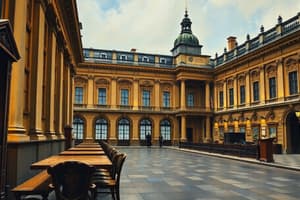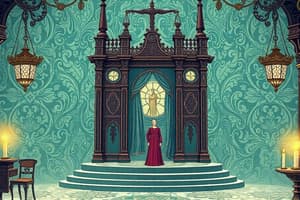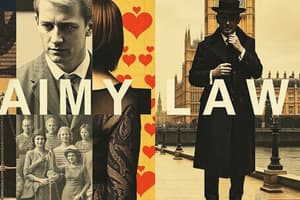Podcast
Questions and Answers
What is the main role of a barrister in the courtroom?
What is the main role of a barrister in the courtroom?
- To argue a case before a judge or tribunal (correct)
- To conduct criminal prosecutions
- To keep the peace in a lower court
- To provide legal services in various areas of law
What is the title given to a senior barrister appointed by the Queen?
What is the title given to a senior barrister appointed by the Queen?
- Justice of the Peace
- Crown Prosecutor
- Lord Advocate
- Queen's Council (correct)
Who is responsible for conducting most criminal prosecutions in England and Wales?
Who is responsible for conducting most criminal prosecutions in England and Wales?
- The Crown Prosecution Service (correct)
- The Magistrates' Court
- The Lord Advocate
- The Attorney General
What is the role of a Justice of the Peace (JP) in England and Wales?
What is the role of a Justice of the Peace (JP) in England and Wales?
What is the title of the chief law officer of the Crown in Scotland?
What is the title of the chief law officer of the Crown in Scotland?
What is the role of a magistrate in a magistrates' court?
What is the role of a magistrate in a magistrates' court?
What is the purpose of an inquest conducted by a coroner?
What is the purpose of an inquest conducted by a coroner?
What is the role of an usher in a court?
What is the role of an usher in a court?
What is the main difference between criminal law and civil law?
What is the main difference between criminal law and civil law?
How many distinct legal systems exist in the UK?
How many distinct legal systems exist in the UK?
What is the characteristic of the Constitution of the United Kingdom?
What is the characteristic of the Constitution of the United Kingdom?
What is the significance of Magna Carta (1215)?
What is the significance of Magna Carta (1215)?
What is the role of the Lord Chancellor?
What is the role of the Lord Chancellor?
What is the position of the Lord Chief Justice of England and Wales?
What is the position of the Lord Chief Justice of England and Wales?
What is the characteristic of the court system in the UK?
What is the characteristic of the court system in the UK?
What is one of the constitutional principles of the UK?
What is one of the constitutional principles of the UK?
Flashcards are hidden until you start studying
Study Notes
UK Legal System
- In the UK, there are two main areas of law: criminal law (between state and individual) and civil law (between individuals or private entities)
- The UK does not have a uniform legal system, with different systems for England and Wales, Northern Ireland, and Scotland
- Courts are organized in a hierarchical system, with cases typically starting at the lowest level and potentially being appealed to higher courts
Constitution
- The UK's constitution is unwritten and not codified into a single document
- Key constitutional principles include parliamentary sovereignty, the rule of law, democracy, and upholding international law
- Certain Acts of Parliament have special constitutional status, including the Magna Carta (1215)
Legal Positions
- The Lord Chancellor is a Cabinet minister and Head of the Ministry of Justice for England and Wales
- The Lord Chief Justice of England and Wales is the Head of the Judiciary and President of the Courts
- Lawyers in England and Wales come in two types: barristers (professional legal advisers and courtroom advocates) and solicitors (provide legal services in various areas of law)
- Queen's Council (QC) are appointed senior barristers who have the right to wear silk gowns and take precedence in court
- The Crown Prosecution Service (CPS) conducts most criminal prosecutions
- A Justice of the Peace (JP) is a judicial officer elected or appointed to keep the peace
- The Attorney General is the chief law officer of the Crown in England and Wales, while the Lord Advocate serves in Scotland
- A magistrate is an unpaid volunteer who serves in a magistrates' court, with paid district judges also available
- In court, you may find a lawyer for the defence, a lawyer for the prosecution, magistrates (The Bench), a judge, a clerk, an usher, the defendant, witnesses, a jury, and dock officers
- A Coroner holds an inquest to determine the details of a deceased person's death
- An Usher is a servant who takes care of the jury and carries out minor services
Studying That Suits You
Use AI to generate personalized quizzes and flashcards to suit your learning preferences.




